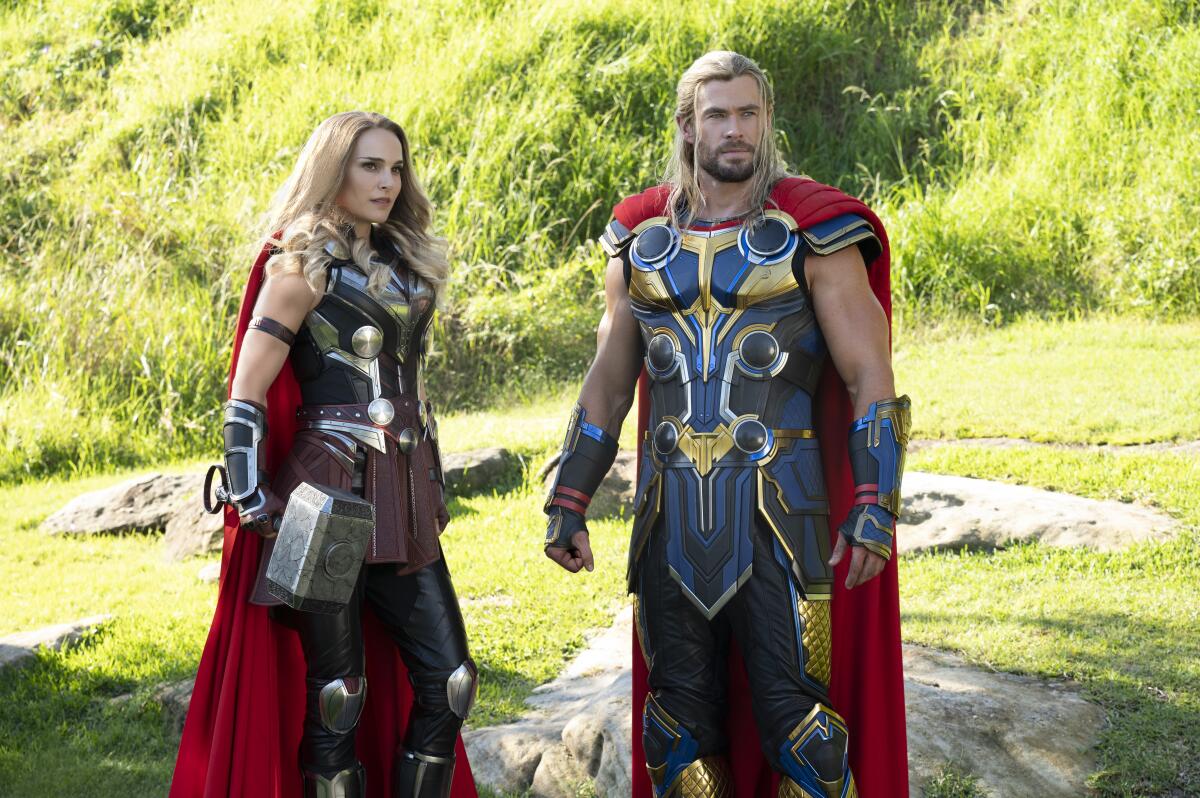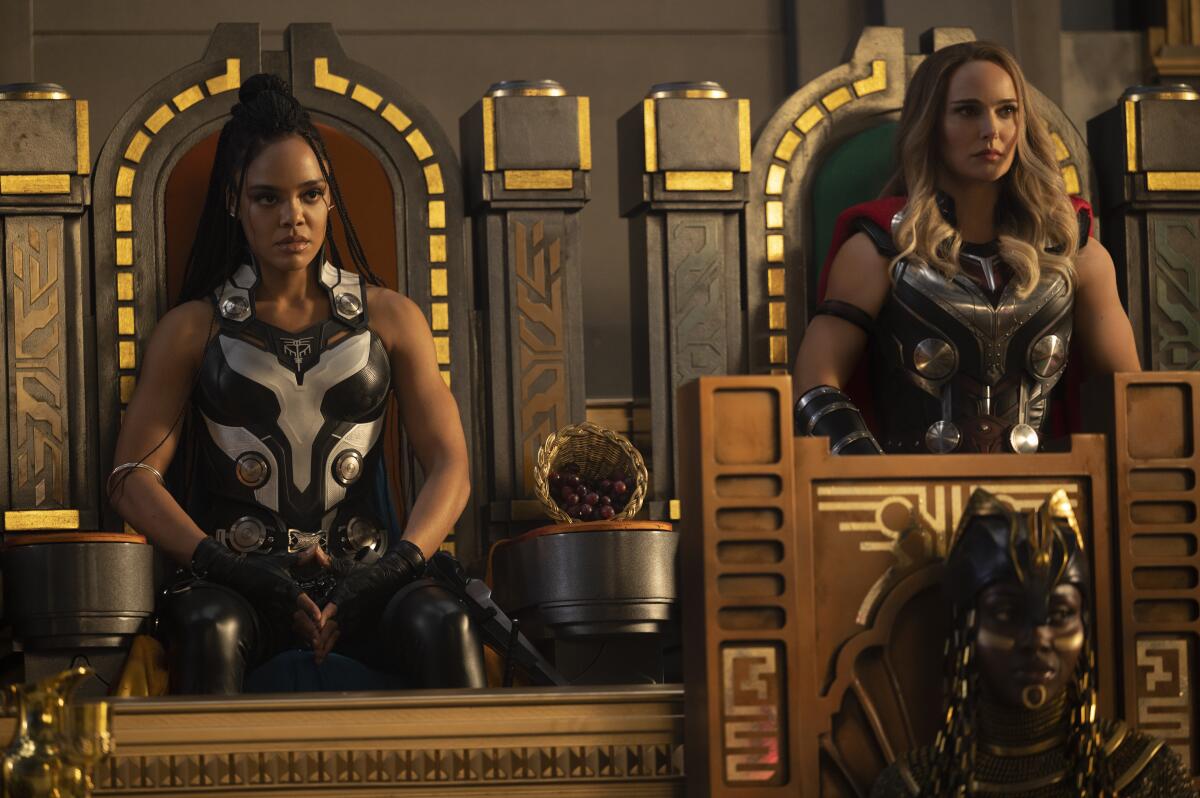A not-so-mighty ‘Thor’ sequel is painless but pointless

- Share via
There are a few good things worth singling out in the otherwise not-very-good thing that is “Thor: Love and Thunder.” First up are two large screaming goats, whose digitally amplified screeches are a comic gift that rarely stops giving. Christian Bale delivers a genuinely skin-crawling turn as a zombified villain named Gorr the God Butcher, who so closely resembles both Voldemort and “The Nun” that Warner Bros. might want to sue. And then there’s the lovely, loony sight of Russell Crowe, gamely chasséing in a golden breastplate and white tutu as the Greek god Zeus. Are you not entertained?
Still, the best thing about the movie, as far as I can tell, is its running time. To the 60-plus-hours of theatrical content that have so far rolled off the Disney/Marvel assembly line, this fourth Thor-centric caper adds a mostly painless if largely pointless 120 minutes. And that happily includes the closing credits, which fans will of course sit through in their entirety, dutifully enduring the names of visual-effects artists and crane operators in exchange for a glimpse of future Marvel superheroics. Minding the usual anti-spoiler entreaties, I can disclose that at the very end — right after [redacted] arrives at [redacted] and speaks to [redacted] — a title card pops up with some reassuring if not exactly surprising news: “THOR WILL RETURN.”
For your safety
The Times is committed to reviewing theatrical film releases during the COVID-19 pandemic. Because moviegoing carries risks during this time, we remind readers to follow health and safety guidelines as outlined by the CDC and local health officials.
Thank God (or gods). But here arises some confusion. By “Thor,” I’m pretty sure the movie means the majestically mulleted Norse deity Thor Odinson, played as ever by Chris Hemsworth with such genial charm that even his biceps seem to be smiling at you. But as you’ve doubtless heard, “Love and Thunder” features another aspirant to the Thor mantle. That would be Dr. Jane Foster (Natalie Portman), leading American astrophysicist and Thor’s mortal soulmate from “Thor” (2011) and “Thor: The Dark World” (2013). In this movie, as in the Jason Aaron-penned comic-book volumes from which it draws inspiration, Jane has stage IV cancer — a near-certain death sentence that also brings about her unexpected transformation into her own blond-tipped, red-caped superhero, known as the Mighty Thor.
Jane achieves this by wielding Thor’s old hammer Mjölnir, which was smashed to smithereens in “Thor: Ragnarok” (2017) and briefly resurrected amid the time-traveling schemes of “Avengers: Endgame” (2019). Now firmly out of retirement, Mjölnir lives to bludgeon and boomerang again in “Love and Thunder,” and also to stir up some amusing jealousy issues where Thor’s new weapon, Stormbreaker, is concerned. It’s a battle of axes and exes, one that seeks to put Thor’s massive ego in check, give the franchise a gender-parity upgrade and renew some long-dormant romantic-comedy sparks.

Unfortunately those aims are lost, or at least frustratingly under-realized, in a blur of flat-footed jokes and lazily schematic plot turns, plus the general sense of a franchise spinning its creative wheels. These issues smack of run-of-the-mill Marvel fatigue, but they also bear the fingerprints of New Zealand-born director Taika Waititi (who co-wrote the script with Jennifer Kaytin Robinson). Having set Thor on a looser, goofier trajectory in “Ragnarok,” Waititi tries to extend that movie’s breezy comic tone into an adventure that strives to be both sillier and sadder. He wants to treat Thor as a figure of fun but also to restore to him a dimension of the pop-cultural grandeur that no Avenger, even a retired Avenger, can do without for long.
And so the movie tries to both mock and burnish Thor’s legend with a series of zippy once-upon-a-time montages that recap the character’s ups and downs, his losses (Loki!) and loves (Jane, among others), and his unusual number of physical makeovers, from “Ragnarok’s” dashing textured-crop-and-eyepatch look to that “Endgame”-era beer belly. It’s enjoyable for a while to relive all this. Thor’s sometimes rudderless evolution over the years speaks to the trickiness of a character that even the well-oiled Marvel machinery hasn’t always been able to crack. It also speaks to the sustaining warmth and versatility of Hemsworth’s star presence, his ability to remain good company even when the movies themselves haven’t been good.
As this latest gets under way, Thor has recovered his enviable god-bod but still has little sense of purpose. The problem with “Love and Thunder” is that it seems to reflect this identity crisis while pretending to solve it. The story begins to splutter with some perfunctory, poorly executed scenes of Thor tagging along with the Guardians of the Galaxy, allowing Chris Pratt, David Bautista, Karen Gillan and others to cash a quick paycheck. Things improve a bit once the action shifts to New Asgard, the bucolic Norwegian town/tourist trap where Thor’s fellow surviving Asgardians have relocated, but even here, the action bogs down in look-at-who-we-got cameos and product placements that are sometimes disguised as jokes about product placements.
All this comic riffery is par for the course for Waititi, whose famously impish humor has made him a popular fit for a risk-averse franchise that rewards personality over personal vision. But his wannabe-breezy comedy has always struck me as awfully strenuous, and the Marvel enterprise seems to encourage his worst instincts; too often he mistakes sloppiness for irreverence and self-satisfaction for self-mockery. Sometimes his comic instincts do pay off, as when Thor, Jane and friends crash a neo-Olympian, Vegas-ready paradise called Omnipotence City, where Crowe’s Zeus preens, prances and speaks in a hilariously awful Greek accent. But the movie is considerably better in those infrequent moments when it strives for sincere, unironic emotion, whether it’s relaying the tragedy that gives rise to Gorr’s murderous reign of terror or exploring Jane’s struggle to evade her own mortality.
That lends a certain poignancy to Jane’s transformations into the Mighty Thor, which, far from healing her, only hasten her cancer’s spread. But none of it makes her an interesting or credible superhero, a liability that the movie tries to milk for bumbling comic relief. There’s nothing inherently interesting about putting a character — or an actor as good as Portman — in a cape and helmet, and it’s frankly depressing to see brainy scientist Jane reduced to a hammer-throwing catchphrase machine. Tessa Thompson fares rather better as Thor’s ally and New Asgard’s ruler, Valkyrie, but she’s still needlessly sidelined here, almost as if two prominent women warriors were too much for the movie to handle.
It does, admittedly, try to handle a lot. “Thor: Love and Thunder” has bright, psychedelic colors and heavy-metal-inspired typefaces, but also a near-horror interlude shot in ghostly black-and-white. It has unmemorable slicey-dicey action scenes and a friendly rock-like sidekick named Korg (voiced by Waititi himself). It has at least two movies’ worth of thudding Guns N’ Roses needle drops, including “Welcome to the Jungle,” “Paradise City” and “Sweet Child O’ Mine.” Speaking of which: The movie has children, lots of children, who are placed in terrible danger when the deranged Gorr decides to become the Pied Piper of New Asgard.
Waititi has a long-standing affinity for young characters, whether he’s making a charmer like “Hunt for the Wilderpeople” or a meretricious clunker like “Jojo Rabbit.” No imaginary Hitlers pop up in “Thor: Love and Thunder” (which, come to think of it, might be the actual best thing about it), but Waititi’s deployment of children here feels both characteristically strategic and irritatingly cynical. The kids raise the stakes, cutesify the story and put a lump in your throat, as kids in movies tend to do. They also sentimentalize Thor in ways that make the inevitable sequel feel, at this stage, like a singularly unappealing prospect.
'Thor: Love and Thunder'
Rating: PG-13, for intense sequences of sci-fi violence and action, language, some suggestive material and partial nudity
Running time: 2 hours
Playing: Starts July 8 in general release
More to Read
Only good movies
Get the Indie Focus newsletter, Mark Olsen's weekly guide to the world of cinema.
You may occasionally receive promotional content from the Los Angeles Times.











